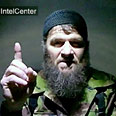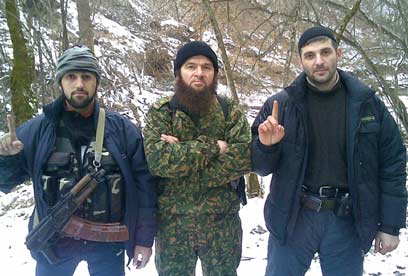
US probes ties between Boston bombing, Chechen group
FBI looking for links between Tamerlan Tsarnaev's trip to Russia and brothers' radicalization
Tamerlan, 26, was killed in a shootout with authorities; while the younger son, Dzhokhar, 19, was injured and taken into custody. Both have left a trail on the internet suggesting they were devout Muslims, proud of their Chechen heritage and supportive of the region's bid for independence from Moscow.
Related stories:
- Boston residents celebrate manhunt's end
- Mother of Boston suspects: It's a set-up
- Boston manhunt: A timeline
The group, led by the Chechen warlord Doka Umarov, dubbed "Russia's Bin Laden," is affiliated with al-Qaeda .
President Barack Obama's administration placed Umarov on a terrorist leaders' list after he took responsibility for the double suicide bombing of the Moscow subway in March 2010 that claimed the lives of 40 people, and the November 2009 attack on a train, killing 26.

Chechen guerrilla commander Doku Umarov surrounded by fellow militants (Photo: AFP)
The investigation was reportedly based on Tsarnaev's Youtube uploads, and his trip to Russia on 2012, during which he visited Dagestan and Chechnya.
Dzhokhar, 19, is still being treated at Beth Israel Deaconess Medical Center in Boston, suffering from serious wounds. It is not clear when he would be charged. He was reported in serious but stable condition and could not face interrogation. Massachusetts Gov. Deval Patrick said Tsarnaev was most likely "not able to communicate yet."
The brothers spent their early years in a small community of Chechens in the central Asian country of Kyrgyzstan, a mainly Muslim nation of 5.5 million. The family moved in 2001 to Dagestan, a southern Russian province at the heart of a violent Islamist insurgency and where their parents still reside.
The FBI confirmed Friday that agents had interviewed Tamerlan Tsarnaev and other family members in 2011 at the request of an unnamed foreign government and “did not find any terrorism activity, domestic or foreign.”
"The Caucasus Emirate group employs explosions, shootings and assassinations to spark a revolution and expel Russian government from the North Caucasus," US government ruled when labeling Umarov 's group a terrorist organization.
A senior US intelligence source said that Russia was "convinced" the Tsarnaevs had a direct relationships with Chechen rebels, predominantly natives of the Dagestan region. Meanwhile, US authorities are looking for links between the older brother's radicalization and his six-month visit to Russia.
The conflict in Chechnya dates back to 1994 during the war where rebels sought to achieve independence for the region, but soon grew into an all-out Islamist insurgency aimed to establish an Islamic Caucasus.
Russian forces withdrew from Chechnya in 1996 after the First Chechen War, and left behind massive disarray with virtually no one dominant governing force. Three years later, Russian forces entered Chechnya in the wake of the blasts in Moscow and other cities, the responsibility for which was assigned to the Chechen rebels.
With Ramzan Kadyrov, a former rebel whose rule enjoys the support of the Kremlin, stability returned to Chechnya, though Kadyrov was accused of multiple human rights abuses. But the Islamic insurgency has spread to neighboring provinces, with Dagestan – sandwiched between Chechnya and the Caspian Sea – now seeing the worst of the violence. Militants launch daily attacks against police and other authorities.
Fighters from Chechnya and neighboring provinces carried out a series of terrorist attacks in Russia, including the hostage crisis in a Moscow theater in 2002, when 129 people lost their lives, the school hostage crisis in the southern Russian town of Beslan, which claimed 330 lives, and numerous terror attacks in Moscow and other cities.
The US security think tank Stratfor said Friday that if the Tsarnaev brothers had any link to al-Qaeda, or one of its franchise groups, it would "likely be ideological rather than operational, although it is possible that the two have attended some type of basic militant training abroad."
Stratfor added that the Boston bombings highlighted the fact that "the jihadist threat now predominantly stems from grassroots operatives who live in the West rather than teams of highly trained operatives sent to the United States from overseas, like the team that executed the 9/11 attacks."
"There will always be plenty of soft targets in a free society, and it is incredibly easy to kill people, even for untrained operatives," it said.
On his social media web page, Boston bombing suspect Dzhokhar Tsarnaev joked about the reputation of people from the North Caucausus for conflict with the authorities: "A car goes by with a Chechen, a Dagestani and an Ingush inside. Question: who is driving?"
The answer: the police.
Caucasus rebels on Sunday denied they were involved in the Boston blasts. A Dagestani rebel commander was quoted by AFP as saying "We are not working against the United States, only against Russia."
- Receive Ynetnews updates directly to your desktop










